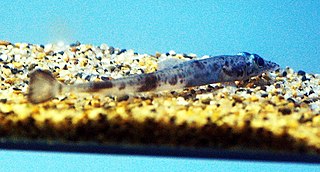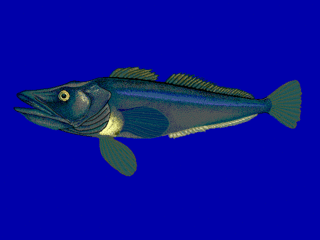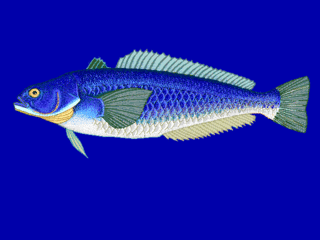The Bathydraconidae, or the Antarctic dragonfishes, are a family of marine ray-finned fishes, notothenioids belonging to the Perciform suborder Notothenioidei. The family comprises four genera. These fishes are endemic to deep waters off Antarctica.

The painted notie, or painted notothen, is a species of marine ray-finned fish, belonging to the family Nototheniidae, the notothens or cod icefishes. It is native to the Southern Ocean.

Paranotothenia magellanica, also known as Magellanic rockcod, Maori cod, blue notothenia or orange throat notothen, is a species of marine ray-finned fish, belonging to the family Nototheniidae, the notothens or cod icefishes. It is native to the Southern Ocean. "Maori chief" and "black cod", sometimes used for this species, usually refer to fishes from the related genus Notothenia. Being a perciform fish, it is unrelated to the true cods of the order Gadiformes. This species is commercially important as a food fish.

Pagothenia is a genus of marine ray-finned fishes, belonging to the family Nototheniidae, the notothens or cod icefishes. These fishes occur in the Southern Ocean.
Acanthodraco is a monotypic genus of marine ray-finned fish belonging to the family Bathydraconidae, the Antarctic dragonfishes, its only species is DeWitt’s dragonfish. They are found in the Southern Ocean and the southeastern Pacific Ocean.
Akarotaxis is a monotypic genus of marine ray-finned fish belonging to the family Bathydraconidae, the Antarctic dragonfish, its only species is Akarotaxis nudiceps. They are found in the Southern Ocean along the continental shelf of Antarctica.

Bathydraco is a genus of marine ray-finned fishes belonging to the family Bathydraconidae, the Antarctic dragonfishes. They are native to the Southern Ocean.

Mawson's dragonfish is a species of Antarctic dragonfish native to the Southern Ocean around Antarctica. It is found at depths of from 110 to 300 metres over the continental shelf. This species is the only known member of its genus.
Gerlachea is a monotypic genus of marine ray-finned fish belonging to the family Bathydraconidae, the Antarctic dragonfishes, its only species is Gerlachea australis. It is found at depths of from 200 to 670 metres over the Antarctic continental shelf. This species is the only known member of its genus.

The ploughfish is a species of Antarctic dragonfish native to the Southern Ocean around Antarctica. It is found at depths of from 0 to 550 m over the Antarctic continental shelf. This species is the only known member of its genus.

Parachaenichthys is a genus of marine ray-finned fish belonging to the family Bathydraconidae, the Antarctic dragonfishes. They are found in the Southern Ocean around Antarctica.

Prionodraco is a monotypic genus of marine ray-finned fish belonging to the family Bathydraconidae, the Antarctic dragonfishes, its only species is Prionodraco evansii. These fishes are native to the Southern Ocean.
Racovitzia is a genus of marine ray-finned fish belonging to the family Bathydraconidae, the Antarctic dragonfishes. They are found in the Southern Ocean around Antarctica.
Vomeridens is a monotypic genus of marine ray-finned fish belonging to the family Bathydraconidae, the Antarctic dragonfishes, its only species is Vomeridens infuscipinnis. These fishes are native to the Southern Ocean.

Channichthys is a genus of marine ray-finned fish belonging to the family Channichthyidae, the crocodile icefishes. They are native to the Southern Ocean.

Pseudochaenichthys is a monotypic genus of marine ray-finned fish belonging to the family Channichthyidae, the crocodile icefishes. Its only member is Pseudochaenichthys georgianus, the South Georgia icefish, which is found in the Southern Ocean.

The longfin icedevil, also known as the threadfin pinhead, is a species of marine ray-finned fish belonging to the family Nototheniidae, the notothens or cod icefishes. It is native to the Southern Ocean where it can be found at depths down to 850 metres (2,790 ft). This species grows to a length of 42 centimetres (17 in) TL. This species is the only known member of its genus and is of no interest to commercial fisheries.
Nototheniops is a genus of marine ray-finned fishes belonging to the family Nototheniidae, the notothens or cod icefishes. The species in this genus are native to the Southern Ocean.

Paranotothenia is a genus of marine ray-finned fishes belonging to the family Nototheniidae, the notothens or cod icefishes. These fishes are native to the Southern Ocean.

Gvozdarus svetovidovi, the naked-head toothfish, is a species of marine ray-finned fish belonging to the family Nototheniidae, the notothens or cod icefishes. It is found in the Ross and Cooperation Seas, probably south of the Antarctic Polar Front from pelagic waters down to depths of 550 m (1,804 ft), though it is normally found in a pelagic environment.












